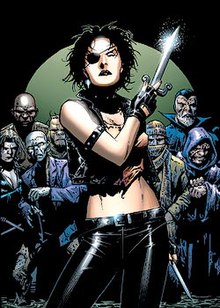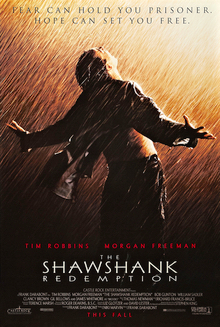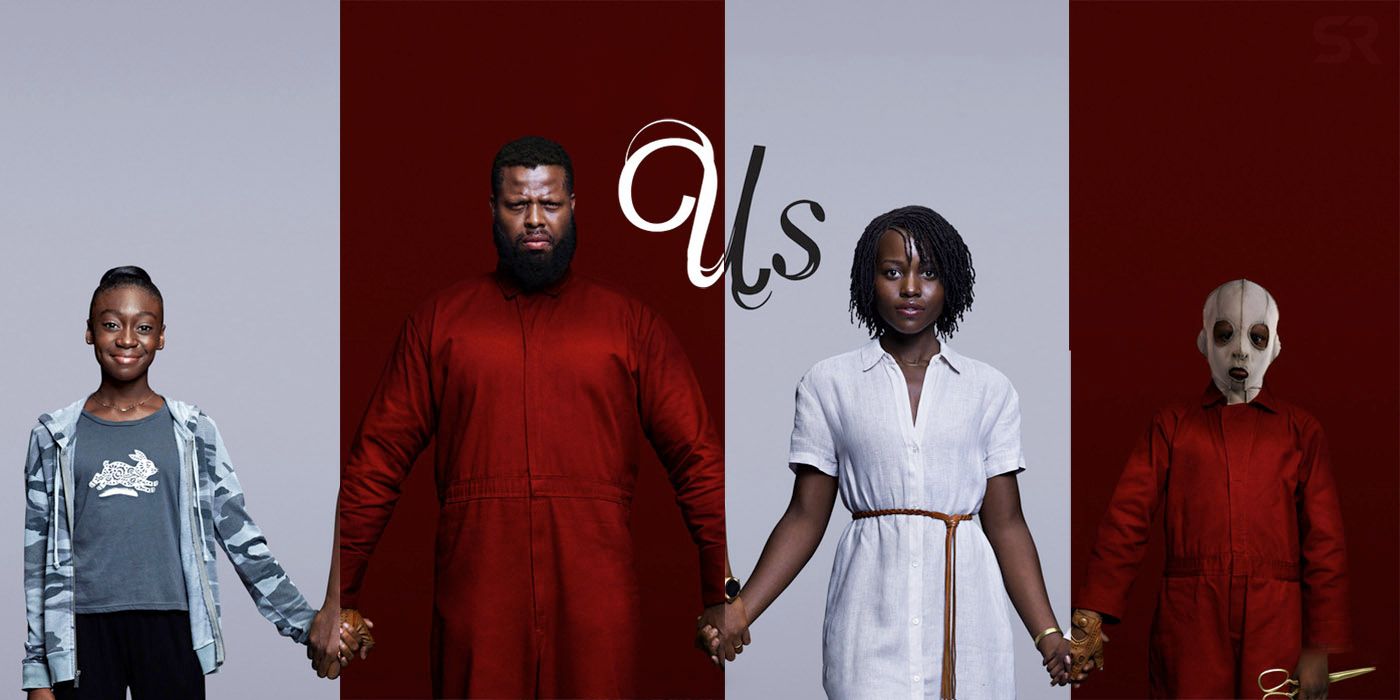Us stars Lupita Nyong'o as Adelaide Wilson, a wife and mother who begins to get worried as her family sets out on their usual summer vacation. While her hapless husband Gabe(Winston Duke) feels that there's nothing wrong, Adelaide's sense of foreboding is rooted in a childhood incident that occurred at very same beach they're visiting.
Her worst fears are confirmed that night as the Wilson's vacation home is invaded by a bizarre set of visitors that somehow form a family. This sinister suburban quartet are deadly doppelgangers who are part of a larger group of underground dwellers that called themselves "The Tethered" and their intentions are far from friendly:
I don't want to say anymore than that regarding the plot but I will make mention of a couple of other details in this write-up to talk about the themes of the movie(so,mostly spoiler-free).
While Peele does place a number of pop culture references within the story that are easy to spot, there are a few particular ones that came to mind for me that perhaps may be a bit more subtle.
For example, the ragged physical appearance of the Tethered,clad in red jumpsuit style uniforms, are a striking contrast to their upper world counterparts that evokes the Eloi and the Morlocks of H.G. Wells' The Time Machine.
In that fantasy classic, the hero travels into a future where the peaceful,contented Eloi seem to want for nothing and have little to no curiosity about where the bounty of their world comes from. As it turns out, their blissful existence is due to the Morlocks, a gruesome looking bunch who use underground machinery to keep the Eloi comfortable. Their main goal is to have those softened up surface dwellers be an essential part of their balanced diet,so to speak.
The term Morlock has also been part of the X-Men universe, as the name of several mutant groups that live in sewers and other hidden places as outcasts from both the human and mutant society. They also strike out against their upper world oppressors despite having a hand held out in friendship by those they insist are their enemies. In either fictional context, Morlocks and Eloi are symbols of class warfare which is at the heart of the story of Us:
Class is one of those things that American society tends to deny still exists but many of our best books and films deal with this subject over and over again due to it's timely nature and continuing relevance.
While Get Out dealt with both the horrors of racism and the hypocrisy from those claiming to be "the good ones", Us hits a deep nerve about the haves and the have-nots of our present day society that is probably a lot scarier to some than that previous film was.
In interviews,Peele has mentioned several social commentary touches made in the film, with one being the prison industrial system. It's not a coincidence that the Tethered are wearing brightly colored jumpsuits and that part of their violent behavior,as we learn during the film, is due to being trapped in an isolated,underground setting and forced into repetitive actions that do nothing to advance them as viable beings.
While prisons are meant to be for the common good, more often than not, they have become sources of unnecessary evil that do little to make the inmates better people able to properly function in the world once their sentence is over. We've seen this imbalance portrayed on screen before, most notably in The Shawshank Redemption that happens to be based upon a Stephen King novella. Interesting how horror writers are more able to humanize the socially despised than many of the so-called "well intended" folks out there:
There's more than one way to strip a person of their humanity and Us highlights just how far such demeaning treatment can go before before payback is unleashed on those who least expect it yet they should.
We are given quite a lot to unpack with the terrors piled into this fearsome treasure chest of a film. However, key among them is the whole concept of "othering"-making an entire section of the population appear to be either the cause of everything that's wrong with the world or condescended to with makeshift solutions that don't follow through towards truly leveling the playing field.
In a bizarre mirror fashion, we see this reflected in real life as we do in reel based realms especially in sci-fi and fantasy. It's become a main staple of comic book lore over the years and strongly showcased in their adaptations,whether on TV or in movie theaters. Regardless of whether you call them mutants,metahumans or space aliens, most of the time the true danger comes from the suppressed secrets and polite lies that "regular" people tell each other and expect everyone to believe:
I would love to dive into more depths about Us here but for those reading this who haven't seen the movie yet, I don't want to ruin that initial experience for you. What I will say is that Jordan Peele is not just a burgeoning master of modern day horror, he is doing something no one else in Hollywood appears to be doing ; respecting the intelligence of the audience.
Unlike those who want to spoon fed plot points to movie goers, Peele balances the entertainment elements of his films with a hearty amount of mental meat on the story bone for them to enjoy engaging in afterward. That's not easy to do,granted, but when it's done well, it's worth noticing and encouraging others to be just as daring.
Us has quite a bit to say for itself and maybe if we all paid a bit more attention to the real world fear factors that the movie is holding up a huge horrifying mirror to, perhaps we will get a little closer to being our true best selves.
In my opinion, one of the most haunting images of the film is a nod to Hands Across America, an event in the 1980s that was intended to be unifying but instead is a symbol of many an empty gesture that was to come. Let's not ignore what this movie is telling us about our present and possible future by gazing into a glaring error from the past:






No comments:
Post a Comment